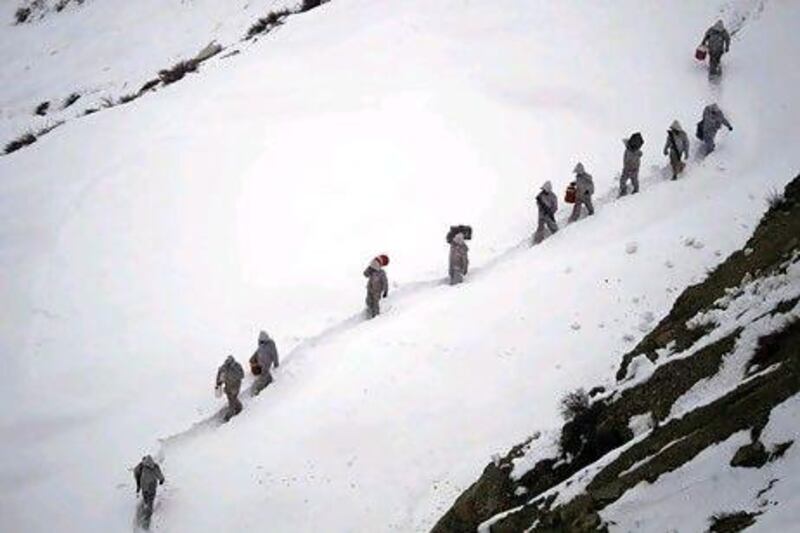ISLAMABAD // A massive avalanche hit a Pakistani military base in Kashmir yesterday, burying more than 100 soldiers.
Rescuers made frantic efforts yesterday to find any sign of life at Gayari sector of Siachen Glacier, which has been described as the world's highest battlefield, along the border with India.
A military official said rescue efforts had been stopped because of darkness but would resume early in the morning.
"It's a very remote and difficult terrain. In some areas, there are no roads. Weather is also bad. The rescue operation can last for few days," the official who spoke on condition of anonymity said,
Hundreds of troops, sniffer dogs and mechanical equipment were at the scene, but were struggling to make much headway into the avalanche, which crashed down onto the rear headquarters building in the Gayari sector, burying it under more than 20 metres of snow, said the army spokesman, Major General Athar Abbas.
"It's on a massive scale," he said. "Everything is completely covered."
Bad weather conditions and poor communication facilities in the far-flung area were hampering rescue efforts.
Another military spokesman, Brigadier Atiqur Rehman, denied any bodies had been recovered or anyone rescued.
"Not a single body has been recovered. It's a huge slide, and it will take time to remove it."
The Gayari sector is about 200 kilometres from Skardu, a major town in the northern Gilgit-Baltistan province. The avalanche struck the battalion headquarters of the Northern Light Infantry - which is mostly made up of provincial residents - at 6am, the military said.
The military official said heavy machinery had been airlifted to Skardu but they were facing difficulties in transporting it to the far-flung area.
The military did not specify how many soldiers were buried, saying it was more than 100, including the battalion commander. Some reports said up to 135 soldiers were trapped.
The headquarters in Gayari is the main gateway through which troops and supplies pass on their way to other more remote outposts in the sector. It is situated in a valley between two high mountains, close to a military hospital, according to an officer who was stationed there in 2003.
"I can't comprehend how an avalanche can reach that place," said the officer. "It was supposed to be safe."
Yusuf Raza Gilani, the prime minister, expressed shock over the "loss of lives and trapping of soldiers" and said he would monitor the situation from Islamabad.
"The incident in no way would undermine the high morale of soldiers and officers," he said.
Soldiers at the Siachen Glacier have been deployed at elevations of up to 6,700 metres.
More soldiers have been killed by extreme weather there than combat.
Hundreds of soldiers have been kill from both sides.
Siachen is in the northern part of Kashmir, the core dispute and cause of the two of the three wars between Pakistan and India since their independence from British rule in 1947.
Both countries have held several rounds of talks to demilitarise the Siachen but have failed to do so because neither wants to take first step.
There are a combined 10,000 to 20,000 soldiers from Pakistan and India deployed in the area.
[ foreign.desk@thenational.ae ]
* With additional reporting by Associated Press





